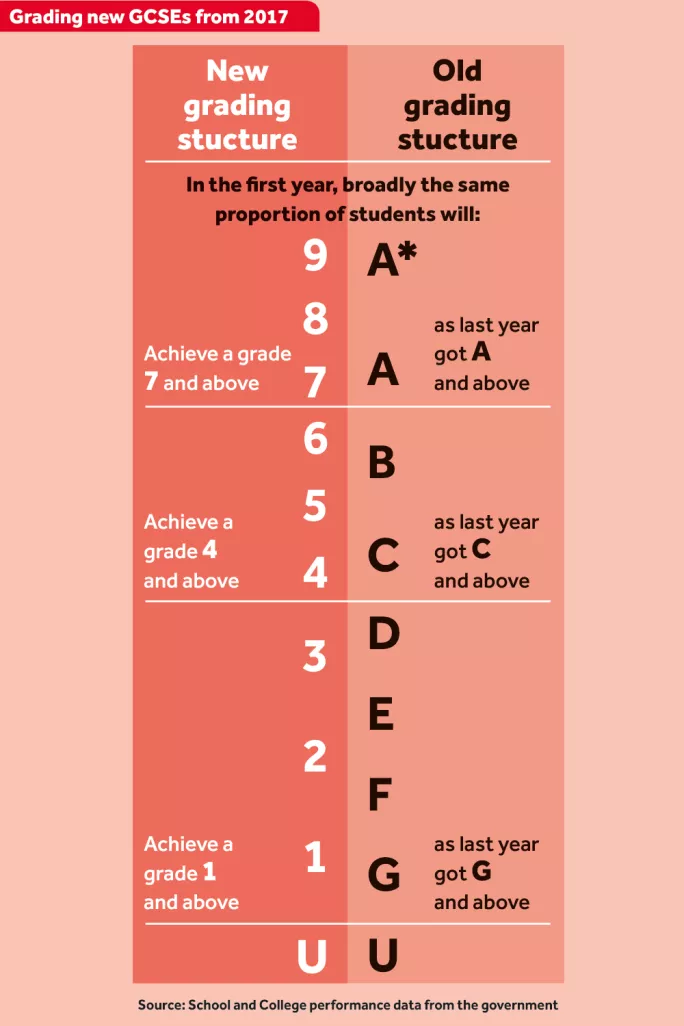
- Home
- GCSE results day 2017: the greatest unknown quantity in modern education
GCSE results day 2017: the greatest unknown quantity in modern education

A little more than two years ago, I took on the job of coordinating GCSE English at a school in South London. In any other year, this would have been a massive step with a hugely important set of responsibilities to consider. This wasn’t any other year. This was 2015, the year the prophecy had foretold. This was the year of the new specifications.
It is not the scope of this column to go over the myriad intricacies of how new-spec and old-spec GCSEs differ.
It can be summarised as: no more coursework, 100 per cent exams, greater emphasis on knowledge and memory instead of broadly applicable skills, more “academic rigour” and the old letter system of A*-U is now replaced with 9-1. In short, a comprehensive and systematic overhaul of 10 years of New Labour education policies.
- When is GCSE results day 2017?
- How does progress 8 work?
- How to tell your exam results day story: A guide for headteachers
Preparing my department to begin teaching these new GCSEs was one of the most difficult challenges of my career.
New schemes of work needed to be written and decisions needed to be made on what texts to teach. Most importantly, I needed to make sure that the department properly understood the new specification well enough to feel confident delivering it to their students.
The teachers I was working with were highly intelligent and experienced practitioners, but these specifications were published in mid-2015, to be delivered the following September. When was anyone supposed to have had the time to get to grips with this new information?
What I have always known about teachers, however, is that we rise to the challenges of a chaotic situation.
Every one of us put in the hours to learn new texts and topics inside out, familiarised ourselves with the new sample assessment materials and advice from the exam board that was fed to us piecemeal over the course of the year, attended training sessions and put countless hours into crafting lessons that prepared students for the new set of competencies on which were being assessed.
We did all this with no extra time off, teaching full timetables that included Year 11s sitting the “old spec” for the last time and A-level students who were also preparing for a completely new specification.
Two years on, with a few days left until results day, I feel confident enough in saying that we did our bit.
Nonetheless, this results day does represent a great unknown in education. There are questions for which we need to prepare ourselves. Here are a few that I shall be asking:
How does the new system affect the performance of different types of student?
For generations to come, statisticians will use the current British educational experiment to answer all manner of questions about educational reform.
By comparing last year’s cohort to this year’s, we will have incredibly fruitful data about how performance in this new system of examination will correlate with gender, parental income, postcode, ethnicity, students with behavioural issues and more.
It is the duty of every school to do their own independent research and reach conclusions about how best to serve their students in this regard.
How will the exam boards factor in the various exam-paper blunders made this summer?
Without needing to rehash all of the details, there have been genuine glaring errors made in certain key exam papers this year, one of which seemed to indicate a fundamental misunderstanding of Romeo and Juliet.
In these instances, schools need to be sure to recall a sample of graded papers so that we can have a detailed look at how these responses were graded and prepare our students for what to do if they are faced with a similarly fallacious paper next year.
 What does a level 9 look like?
What does a level 9 look like?

Something which Ofqual and the exam boards have been fairly cagey about throughout this whole reformation process has been prescribing what a top-grade response to an exam actually looks like.
This is partly because of the shifting boundaries and the fixed quota of students who are eligible to achieve each grade. So, schools, on results day you need to call back samples of as many exam papers as your budget will afford you - especially the level 9s.
You also need to share them among as many other schools as you can - not only the ones in your MAT, or another syndicate. Take the names off them and distribute them among yourselves as widely as possible, so that there can be some level of transparency about what the exam boards currently consider to be the zenith of academic achievement.
Make a hub, make a Wiki, make something free to which all schools have access and can contribute.
What will employers make of it all?
This is going to take a few years to understand, but we are yet to discover just how businesses are going to take to these new, numbered qualifications our students now have to put on their CVs.
My personal preference would be for young people to be allowed to put the equivalent letter grade in brackets next to their number for the next few years, while employers begin to get their head around how it all works (eg “Geography - 7 (A)”).
However, because the new grades do not neatly translate into old ones, there would need to be some understanding of how even this could work.
How will it affect teachers?
For years now, results day has been an anxious dark cloud in the summer holidays for many teachers. Lots of schools across the country have used the performance of a teacher’s students to inform their performance management review and whether or not they will receive a pay progression.
This always seemed like a slightly rigged game at the best of times, but with the amount of uncertainty faced about this summer’s results, teachers have more reason than ever to keep their fingers crossed and hope for blind luck rather than being able to take calm confidence that they did their job properly and that was enough.
As is the case every year, this summer’s results are about the future and the opportunities we have hopefully passed onto a cohort of students at an important moment in their lives.
This year, however, it is equally important to consider our future as schools and the path which we are on under the new examination system.
Phil Brown is a writer and English teacher from South London
Keep up to date with all the latest GCSE news, views and analysis on our GCSE hub.
Register with Tes and you can read five free articles every month, plus you'll have access to our range of award-winning newsletters.
Keep reading for just £4.90 per month
You've reached your limit of free articles this month. Subscribe for £4.90 per month for three months and get:
- Unlimited access to all Tes magazine content
- Exclusive subscriber-only stories
- Award-winning email newsletters
You've reached your limit of free articles this month. Subscribe for £4.90 per month for three months and get:
- Unlimited access to all Tes magazine content
- Exclusive subscriber-only stories
- Award-winning email newsletters



